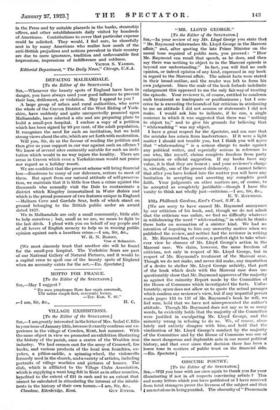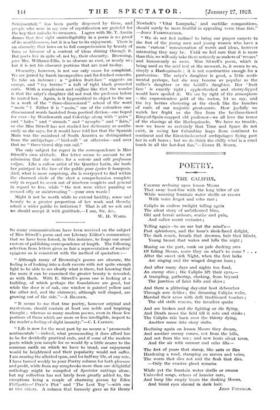OBSCURE POETRY.
[To the Editor of the SPECTATOR.]
Sra,—W111 you bear with me once again to thank you for your illuminating if not in all respects convincing article ? This and many letters which you have published or I have received from total strangers prove the liveness of the subject and that I am not alone in being puzzled. The obscurity of " Promenade
Sentimentale " has been partly dispersed by these, and people who were in my case of mystification are grateful for the key that unlocks its treasures. I agree with Mr. T. Austin James that first sight unintelligibility in a poem is no proof of its worthlessness, but it is a bar to its enjoyment. There is an obscurity that lures on to full comprehension by beauty of form or because of a content of ideas shining through it. But poets live in spite of, not by, their obscurity. Browning, pace Mrs. Williams-Ellis, is as obscure as ever, or nearly so ; but it is not his obscurer portions that are read to-day.
Obscurity, however, is not our only cause for complaint.
We are jarred by harsh incongruities and far-fetched conceits. To take an instance : a " golden fruit-face " suggests an orange, and " ivy berries " a tuft of tight black pomaded curls. With a complexion and coiffure like that the wonder is that the satyr's daughter did not rout the professor before he routed her. Again, is it hypercritical to object to the use in a work of the " three-dimensional " school of the word " main " ? Either it is " main," one of the colourless one- dimensional words banished from poetical diction—one hoped for ever—by Wordsworth and Coleridge along with " gales " and " bales " and " strands " and " nymphs " and " fairs," or else Miss Sitwell has not studied her dictionary as assidu- ously as she says, for it would have told her that the Spanish Main was the mainland of South America as distinguished from the archipelago—" bird-soft " or otherwise—and over that no " three-tiered ship can sail."
The only subject for regret in the correspondence is Miss Sitwell's own attitude. Her letter seems to amount to an admission that she writes for a coterie and odit profanum vulgar. Like a callow artist of the Quartier Latin, she hurls her paintpot in the face of the public pour dpater le bourgeois. And, what is more surprising, she is overjoyed to find within the charmed circle of the elect a comprehension complete only in regard to seven out of nineteen couplets and general in regard to five, while " the rest were either puzzling or seemed silly or uninteresting "—your own words !
Might it not be worth while to extend lucidity, sense and beauty to a greater proportion of her work and thereby admit a wider public to initiation ? That is all we ask and we should accept it with gratitude.—I am, Sir, &c.,
W. H. WARD.
So many communications have been received on the subject of Miss Sitwell's poem and our Literary Editor's commentary that we have been forced, in this instance, to forgo our usual custom of publishing correspondence at length. The following selection from letters gives as fair a representation of readers' opinions as is consistent with the method of quotation :—
" Although many of Browning's poems are obscure, the feeling is of looking into a dark cavern with not quite enough light to be able to see clearly what is there, but knowing that the more it can be examined the greater beauty is revealed, as with Bach. With E. Sitwell's poem one is looking at a building, of which perhaps the foundations are good, but while the door is of oak, one window is painted yellow and the other red, and the chimneys, although well shaped, are growing out of the side."—A READER.
" It seems to me that true poetry, however original and mysterious, should contain at least one noble and inspiring thought ; whereas so many modern poems, even in those few portions of them which are more or less intelligible, impart to the reader a feeling of slight insanity."—C. I. CAPRON.
" Life is now for the most part by no means a ` promenade sentimentale '—indeed, what promenading it does afford has to be for decidedly practical ends, and if some of the modern poets which you sample for us would fly a little nearer to the common earth on which we have to tread, our enjoyment would be heightened and their popularity would not suffer. I am nearing the allotted span, and for half-my life, at any rate, I have turned weekly to your Poetry column for both pleasure and profit, while from my scrapbooks more than one delightful anthology might be compiled of Spectator cuttings alone, but my collection has not lately been greatly added to, the exceptions being a couple of charming poems by Eden Philipotts—` Pixie's Plot' and ' The Lost Toy '—with one or two others. A column that formerly gave us Sir Henry Newbolt's Vitai Lampada,' and suchlike compositions, should surely be more fruitful in appealing verse than this." —JOHN FAIRWEATHER.
" We do not feel inclined to bring our prayer carpets to the feet of the young men and young women who have a more ' curious ' concatenation of words and ideas, however interesting they may be. Until we feel sure that it is more than this, we will only take them seriously as makers of ` revues ' and humorously as seers. Miss Sitwell's poem, which is being used as the acid test at the moment, is, it seems to us, simply a Harlequinade ; it is not constructive enough for a pantomime. The satyr's daughter is good, a little senti- mental perhaps, but she may become as popular as the miller's daughter or the bailiff's daughter. Her ` fruit face ' is exactly right ; apple-checked and cherry-lipped would have spoiled it. We see by right of the atmosphere —the expressionless gold of the melon, let us say, and the ivy berries clustering at the cheek like the bunches of curls of our majestic great-aunts. How joyfully we watch her fright as she flies from the be-three-tiered King-of-Spain-mapped old professor—we all love the terror of the chasings at the Harlequinade. We have no trouble, now we know so certainly that Time and Space do not exist, in seeing her Columbine leaps from continent to continent and the Einstein-haunted archipelagos flying past her in soft hazes ; but we do think the chilly wind is a cruel touch in all the hot-foot fun."—Enrrn H. Seam











































 Previous page
Previous page